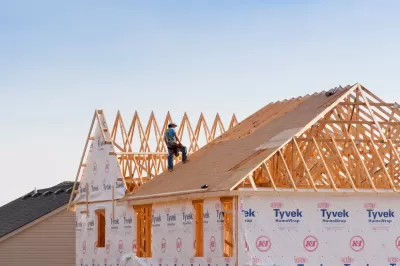It is undeniable that some houses are being bought up by big corporations—but the negative results of such "financialization" actually prove that the law of supply and demand still applies to housing.

A recent Washington Post article proclaimed that Wall Street investors are buying up subdivisions, turning houses into rental properties, and treating tenants unethically. On one of my listservs, NIMBYs and PHIMBYs* are using this reality as evidence that market-rate housing can never bring down rents because of this "financialization" of real estate. (Although different people use the term "financialization" to mean different things, my sense is that in the context of land use policy, the most common usage of the term is that "rich people are buying up real estate and that's bad.")
But if you read the story more carefully, it seems perfectly consistent with the key belief of the pro-housing YIMBY movement: that the law of supply and demand does in fact apply to real estate. The Washington Post article complains that out-of-town investors are "outbidding middle-class homeowners." In other words, demand for housing has increased (because corporations decided to buy houses), thus prices are going up. And if demand affects prices, it logically follows that supply affects houses as well.
Having said that, rapid changes in housing costs do suggest that it is sometimes difficult for supply to shift along with demand. Why? Because demand may change far more rapidly than supply. For example, in Midtown Manhattan where I live, median asking rents for two-bedroom apartments increased from $3950 to $4300 between December 2018 and December 2019, then plunged to $3400 in January 2021, then increased to $4700 in October 2021.
Unfortunately, in the United States supply rarely increases so rapidly. Even where building a house complies with existing zoning, construction of just one house takes months. And government regulation may add months or even years to this process: often, a builder must get a rezoning and/or subdivision approval, and then spend years going through public hearings, buying off potential opponents with concessions, and even going to court to fight off those opponents.** As a result, a demand shock will not immediately be met by increased supply. This reality may explain why, even in markets far more permissive than New York, prices rise with demand. For example, in Austin (one of the nation's fastest growing cities), prices have increased by 25 percent over the past year.
It seems to me that the relationship between demand and supply is a bit like the relationship between coronavirus and countermeasures such as vaccines: just as the virus mutates more rapidly than scientists can create appropriate vaccines, demand changes more rapidly than developers can create housing to meet the demand.
What can we do about this? Americans have three options. We can set the rules of the political game so that supply can rise as rapidly as possible to meet demand, which at least mitigates the supply/demand gap. Or we can raise taxes to build so much public housing that supply will always exceed demand. Or we can just continue to live with the "virus" of rising rents and housing costs—a result that is quite convenient for people who already own condos and houses, but of course is less convenient for those of us who are too poor or too mobile to do so.
*If you don't want to read the links, the meaning of the acronyms above is as follows: NIMBY= Not In My Back Yard (that is, "don't build housing anywhere near me, whether it is private or public"), PHIMBY= Public Housing In My Back Yard (that is, "government-subsidized housing is good but market-rate housing is not so good"), and YIMBY= Yes In My Back Yard (that is, "housing is good").
**This is one reason why the common NIMBY argument that "my city always approves rezonings" is misleading. Even if a city approves 100 percent of upzoning requests, the delay caused by the rezoning process may ensure that it takes a long time for housing to get built, which means that supply may increase at a glacial pace.

Maui's Vacation Rental Debate Turns Ugly
Verbal attacks, misinformation campaigns and fistfights plague a high-stakes debate to convert thousands of vacation rentals into long-term housing.

Planetizen Federal Action Tracker
A weekly monitor of how Trump’s orders and actions are impacting planners and planning in America.

In Urban Planning, AI Prompting Could be the New Design Thinking
Creativity has long been key to great urban design. What if we see AI as our new creative partner?

King County Supportive Housing Program Offers Hope for Unhoused Residents
The county is taking a ‘Housing First’ approach that prioritizes getting people into housing, then offering wraparound supportive services.

Researchers Use AI to Get Clearer Picture of US Housing
Analysts are using artificial intelligence to supercharge their research by allowing them to comb through data faster. Though these AI tools can be error prone, they save time and housing researchers are optimistic about the future.

Making Shared Micromobility More Inclusive
Cities and shared mobility system operators can do more to include people with disabilities in planning and operations, per a new report.
Urban Design for Planners 1: Software Tools
This six-course series explores essential urban design concepts using open source software and equips planners with the tools they need to participate fully in the urban design process.
Planning for Universal Design
Learn the tools for implementing Universal Design in planning regulations.
planning NEXT
Appalachian Highlands Housing Partners
Mpact (founded as Rail~Volution)
City of Camden Redevelopment Agency
City of Astoria
City of Portland
City of Laramie



























